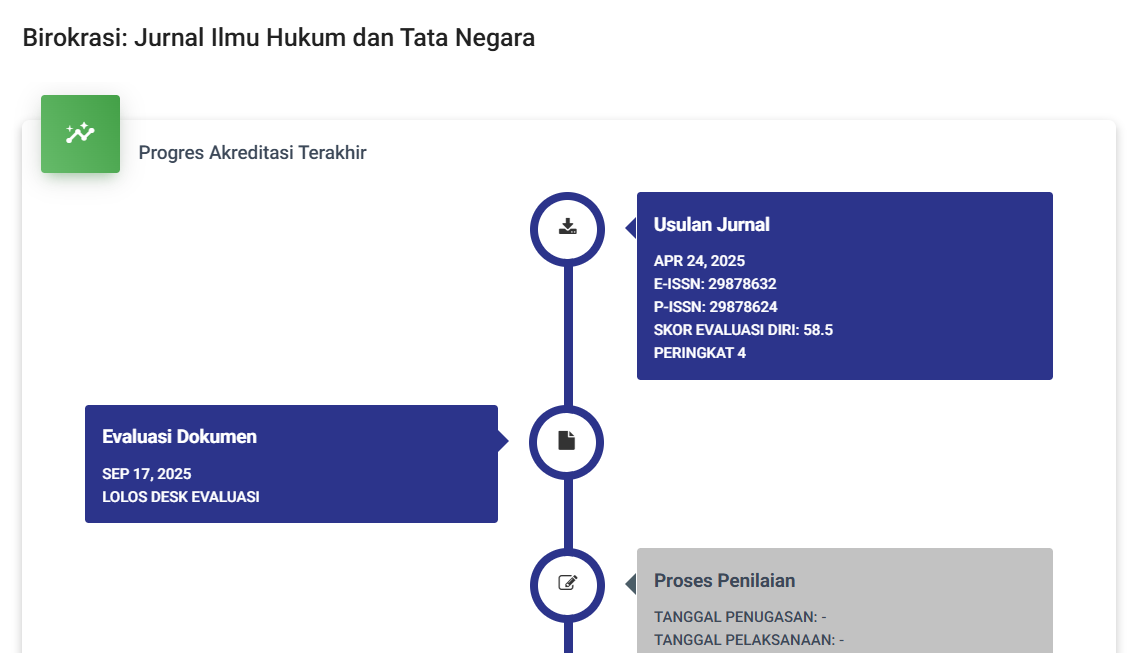Analisis Kedudukan Mahkamah Konstitusi dalam Melaksanakan Hak Uji Materiil (Judicial Review) pada Putusan Nomor 90/PUU-XXI/2023
DOI:
https://doi.org/10.55606/birokrasi.v2i4.1583Keywords:
Constitutional Court, checks and balances, positive legislatorAbstract
The amendment of the 1945 Constitution of the Republic of Indonesia brought significant changes to the structure of state institutions, particularly in the separation of powers. The Constitutional Court, as an institution holding judicial power, has the authority to conduct judicial review based on Article 24 paragraph (2) of the 1945 Constitution. The Constitutional Court Decision No. 90/PUU-XXI/2023 sparked polemics because it was considered a positive legislative decision, which shifted the Court's role from negative legislator to positive legislator. This has created a new phenomenon in the Indonesian constitutional law system, especially regarding the position of the Constitutional Court and the validity of the constitution. This research aims to analyze the effect of the decision on the state institutional system in lawmaking. Using a normative legal approach, this research finds that the decision shows the weakness of the checks and balances system and legalizes a new norm regarding the age of presidential and vice-presidential candidates that does not reflect the interests of society. As a result, the expected substantive justice is not achieved, loosening democracy, and undermining the authority of lawmaking institutions. Therefore, it is necessary to review the authority of the Constitutional Court to prevent abuse of power.
References
Artikel Jurnal
Allan R. Brewer-Carías. (2010). Constitutional Courts As Positive Legislators In Comparative Law. XVIII International Congress of Comparative Law of the International Academy of Comparative Law, 11.
Andiraharja, D. G. (2021). Judicial Review oleh Mahkamah Konstitusi sebagai Fungsi Ajudikasi Konstitusional di Indonesia. Khazanah Hukum, 3(2), 73.
Darmawan, D. A. & A. U. W. (2024). TEORI OPENED LEGAL POLICY DALAM PUTUSAN MAHKAMAH KONSTITUSI NOMOR 90/PUU-XXI/2023. Gorontalo Law Review, 7(1), 120.
Fiqih, P. R., Widodo, A. M., & Firdaus, A. M. (2024). ANALISIS PENERAPAN RULE OF LAW OLEH MAHKAMAH KONSTITUSI SEBAGAI THE GUARDIAN OF CONSTITUTION (Studi Pada Kasus Putusan MK Nomor 90/PUU-XXI/2023). DISCOURSE: Indonesian Journal of Social Studies and Education, 1(3), 238–249.
Isnaeni, B. (2021). Trias Politica dan Implikasinya dalam Struktur Kelembagaan Negara dalam UUD 1945 Pasca Amandemen. Jurnal Magister Ilmu Hukum, 6(2), 85.
Kamaruddin Jafar. (2017). Menguji ‘Positive Legislature’sebagai Kewenangan Mahkamah Konstitusi. Halu Oleo Law Review, 1(2), 250.
Kurniawati, I., & Liany, L. (2019). KEWENANGAN MAHKAMAH KONSTITUSI SEBAGAI NEGATIVE LEGISLATOR DALAM PENGUJIAN UNDANG-UNDANG TERHADAP UNDANG-UNDANG DASAR 1945. ADIL: Jurnal Hukum, 10(1), 111–135.
Nurul Qamar. (2012). KEWENANGAN JUDICIAL REVIEW MAHKAMAH KONSTITUSI. Jurnal Konstitusi, 1(1), 5.
Radita Ajie. (2016). Batasan Kebijakan Pembentuk Undang-Undang (open legal policy) dalam Pembentukan Peraturan Perundang-Undangan Berdasarkan Tafsir Putusan Mahkamah Konstitusi. Jurnal Legislasi Indonesia, 13(2), 217.
Susanto, M. (2017). Kewenangan Mahkamah Konstitusi sebagai Negative Budgeter dalam Pengujian Undang-Undang Anggaran Pendapatan dan Belanja Negara Authority of the Constitutional Court as a Negative Budgeter in the Judicial Review of the State Budget Law. Jurnal Konstitusi, 14(4), 728–756.
Disertasi/Tesis/Paper Kerja
Martitah. (2016). Mahkamah Konstitusi Dari Negative Legislature ke Positive Legislature.
Buku Teks
A. Mukti Arto. (2001). Konsepsi Ideal Mahkamah Agung. Pustaka Pelajar.
Astim Riyanto. (2000). Teori Konstitusi. Yapemdo.
Bachtiar. (2015). Problematika implementasi putusan Mahkamah Konstitusi pada pengujian UU terhadap UUD. Raih Asa Sukses.
Dahlan Thaib et al. (2010). Teori dan Hukum Konstitusi. Rajawali Pers.
Fuady, M. (2011). Teori Negara Hukum Modern. Refika Aditama.
Jimly Asshiddiqie. (2005). Model-model Pengujian Konstitutional di Berbagai Negara. Konstitusi Press.
Jimly Asshiddiqie. (2012). Perkembangan dan Konsolidasi Lembaga Negara Pasca Reformasi. Sinar Grafika.
Khairul Umam. (2016). Teori dan Metode Perubahan Undang-Undang Dasar: Melalui Tafsir Konstitusi Perspektif Budaya Konstitusi. Thafa Media.
Miriam Budiardjo. (2008). Dasar-Dasar Ilmu Politik. PT Gramedia Pustaka Utama.
Moh. Mahfud MD. (2009). Konstitusi dan Hukum dalam Kontroversi Isu. Rajawali Press.
Munafrizal Manan. (2012). Penemuan Hukum oleh MK. Mandar Maju.
Peter Mahmud Marzuki. (2008). Pengantar Ilmu Hukum. Kencana.
Peter Mahmud Marzuki. (2011). Penelitian Hukum. Kencana Prenada Media Group.
Artikel Surat Kabar/Majalah
Pan Mohamad Faiz. (2016). RELEVANSI DOKTRIN NEGATIVE LEGISLATOR. Majalah KONSTITUSI, 6–7.








